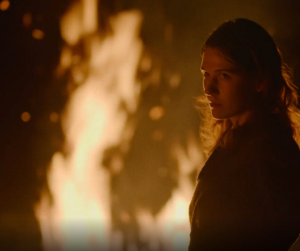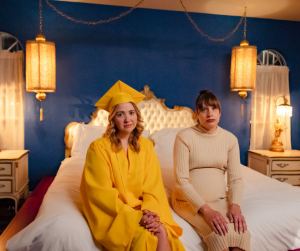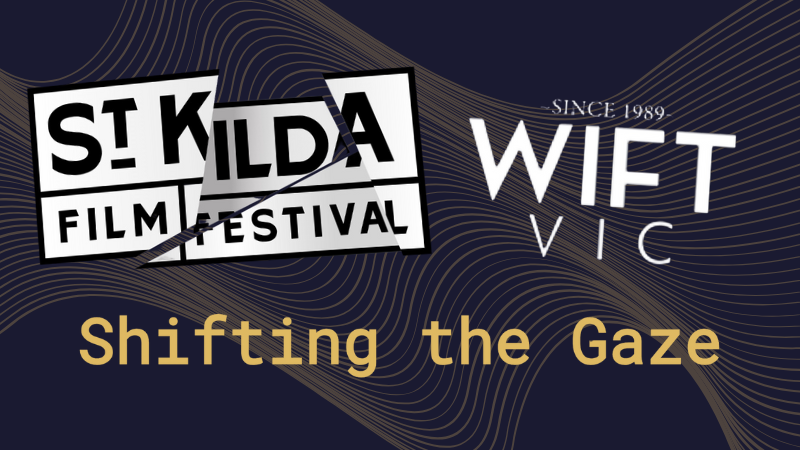Last month, our WIFT organisation was delighted to meet at the Alex Theatre in St Kilda to watch a selection of powerful, female-led shorts as part of our recurring Shifting the Gaze program for the St Kilda Film Festival. As one of our Student Ambassadors, it was an honour to not only be in the room with such talented filmmakers and a keenly engaged audience, but with the fellow members of the WIFT board to celebrate Australia’s rising talent.
From colonial truth-telling in the scrub, to the trauma of home-coming soldiers, from awkward period parties to the ever evolving questions around motherhood, a handful of our filmmakers were joined by our moderator and events manager Katie Page for a post-screening Q+A to answer a central question that many in our industry will be familiar with: why now?
Sarah Hegge-Taylor, the writer and director of the session’s first short Small, answered this question with a frank and refreshing take into the need for “truth-telling” around Australia’s colonial history, sparked for her from dreams of her own colonial ancestry. Hegge-Taylor emphasised the need for a discussion of Australia’s cultural history wars, which she initiated with her unflinching story of a woman trapped by paternal expectations in an unforgiving landscape, and an even more unforgiving disease.

Small – Directed by Sarah Hegg-Taylor
Hegge-Taylor shared her sentiment that following Small, stories from First Nations filmmakers and story-tellers can and should be properly centered, with audiences listening to their own exploration of the disaster smallpox reaped on First Nations communities.
Sharing with our first filmmaker a love of history, the director of Smokescreen, Courtenay Crimeen shared her very relatable dislike of exposition in storytelling, a hard symptom to overcome for such a contained story, that of a traumatised young soldier on his way to face a new kind of battle: returning home.
From on-set inpracticalities to frankly impressive rotoscoping, Crimeen was honest in sharing her struggle to find the confidence to take on the short film format, a medium that demands succinctness. However, from the reactions of our audience, it was clear that the contained location, the compassionate and warm queer subtext and tight story-telling that Smokescreen was a triumph.
Finally, writer, director and star of the darkly comical Call Me Mommy, Haley Alea Erikson threaded the needle of the common theme of trauma in our Shifting the Gaze program. Erikson’s short, a hilariously outlandish story of a single pregnant woman hiring a young improv comedian to literally act out her unborn child’s future life, was born from her own conflicted relationship with her mother. She spoke honestly of the ever shifting desire for parenthood, rocked by growing reproductive inequity in the West, and the resulting erasure of choice.

Call Me Mommy – Directed by Haley Alea Erikson
Erikson championed the importance of telling these stories around the oftentimes traumatic pathways to parenthood and the impact that childhood trauma can place on said pathways. Needless to say, I shared with our audience the excitement of Call Me Mommy’s upcoming feature adaptation shooting here in Australia, set to be produced by our WIFT Vic President Lauren Simpson.
Whilst the filmmakers of our other shorts were unable to join the discussion, Georgia Brogan’s Period Party, Tatiana Wanda Doroshenko’s The Job and Sofya Gollan’s THRESHOLD were also beautifully united in the program’s shared themes on trauma, social-cultural wars and intersectionality between gender, race and ability.
With our gazes well and truly shifted, the evening concluded with lively networking and drinks in the Alex Theatre’s foyer, a fitting conclusion to a set of inspiring and expertly crafted female led stories. It makes me truly excited to witness what comes next for our upcoming events and festivals for the back-half of 2024.
Small – Directed by Sarah Hegg-Taylor
Period Party – Directed by Georgia Brogan
Smokescreen – Directed by Courtenay Crimeen
Call Me Mommy – Directed by Haley Alea Erikson
The Job – Directed by Tatiana Wanda Doroshenko
THRESHOLD – Directed by Sofya Gollan


